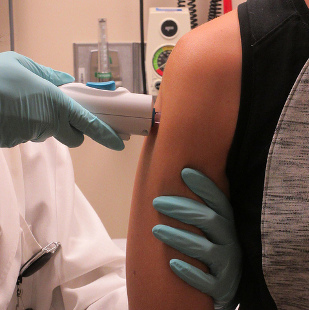 The National Institute of Allergy and Infectious Diseases this week began safety trials for its DNA Zika vaccine.FLICKR, NIAIDScientists studying Zika are moving quickly to generate a vaccine against the mosquito-borne virus that continues to spread through South and Central America and is now encroaching on the continental U.S. In a study published today (August 4) in Science, researchers from Harvard Medical School and the Walter Reed Army Institute of Research in Silver Springs Maryland reported on their tests of three vaccines in Rhesus macaques. It is the first published work to demonstrate the effectiveness of a Zika vaccine in a nonhuman primate model. Each vaccine caused the animals to produce antibody responses to Zika and prevented viremia after subsequent infection.
The National Institute of Allergy and Infectious Diseases this week began safety trials for its DNA Zika vaccine.FLICKR, NIAIDScientists studying Zika are moving quickly to generate a vaccine against the mosquito-borne virus that continues to spread through South and Central America and is now encroaching on the continental U.S. In a study published today (August 4) in Science, researchers from Harvard Medical School and the Walter Reed Army Institute of Research in Silver Springs Maryland reported on their tests of three vaccines in Rhesus macaques. It is the first published work to demonstrate the effectiveness of a Zika vaccine in a nonhuman primate model. Each vaccine caused the animals to produce antibody responses to Zika and prevented viremia after subsequent infection.
“They all seem to work, which is encouraging because it probably means in vivo it’s fairly easy to get protection against Zika,” said James Crowe, an immunologist and infectious disease expert at Vanderbilt University in Nashville, Tennessee, who was not involved in the work.
The first of the three vaccines tested, consisting of formalin-inactivated viral particles, was produced by HIV vaccine researcher Nelson Michael and his team at Walter Reed. Michael had been unable to test the vaccine until fellow HIV researcher, Dan Barouch of the Center for Virology and Vaccine Research at Beth Israel Deaconess Medical Center at Harvard, developed mouse and Rhesus macaque models of Zika infection. Earlier this summer, the two reported that the inactivated virus and a DNA-based vaccine—encoding for the ...






















